Daniel Hannan
| Daniel Hannan MEP | |
|---|---|
 Daniel Hannan, 2017 | |
| Member of the European Parliament for South East England | |
|
Assumed office 14 July 1999 | |
| Preceded by | Office created |
| Personal details | |
| Born |
1 September 1971 Lima, Peru |
| Nationality | British |
| Political party | Conservative |
| Spouse(s) |
Sara Maynard (m. 2000) [1] |
| Children | 3[1][2] |
| Alma mater | Oriel College, Oxford |
| Profession | Writer, journalist, politician |
| Website |
www |
Daniel John Hannan (born 1 September 1971)[3] is a British writer, journalist and politician. He has been a Conservative Member of the European Parliament for South East England since 1999, and is the founding President of the Initiative for Free Trade.[4]
He writes regular columns[5] for The Sunday Telegraph, the International Business Times, ConservativeHome and the Washington Examiner as well as occasional columns in the Daily Mail, The Guardian, The Daily Telegraph, The Sun, The Spectator and the Wall Street Journal. He is editor-in-chief of The Conservative, a quarterly journal of centre-right political thought. He has published several books.
He was the first Secretary-General of the Alliance of Conservatives and Reformists in Europe (ACRE), serving from 2009 to 2018. He was one of the founders of Vote Leave, the organisation that campaigned to leave the EU in 2016, and served on its board throughout the referendum, in which he played a prominent role, participating in multiple public debates.[6]
Hannan speaks French and Spanish and occasionally addresses the European Parliament in those languages.
Early life
Upbringing
Hannan was born on 1 September 1971 in Lima, Peru.[7] His mother was a Scot[8] who had been working in the British Embassy in Lima. His father, whose family origins are Ulster Catholic,[9] had been educated in the UK and had served in Italy during the Second World War with the North Irish Horse of the British Army.[9]
Hannan grew up on his parents' farm outside Lima, attending school and university in Britain.[7] He was educated at Winchester House School, Marlborough College and Oriel College, Oxford, where he studied Modern History.[7] He speaks English, French and Spanish.[10]
He was active in university politics, being elected President of the Oxford University Conservative Association in 1992 - when Nicky Morgan (then known as Nicky Griffith) was his opponent. The two have remained friends.[11] As an undergraduate, he established the Oxford Campaign for an Independent Britain,[12] a group which campaigned against closer EU integration - a theme that was to shape his later career.
On 12 September 1992, he organised a protest at the EU finance ministers' summit in Bath against membership of the European Exchange Rate Mechanism. Three days later, the pound was forced to leave the system in an event known as Black Wednesday. In an article published in the Daily Telegraph, Hannan suggests that his protest activities were connected with this event.[13]
Early political career
After graduating in 1993, Hannan became the first director of the European Research Group, an organisation for Eurosceptic Conservative MPs chaired by Michael Spicer. From 1994-95, he served as Chairman of the National Association of Conservative Graduates.[14]
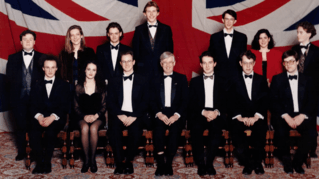
In 1996, he became a leader-writer at the Daily Telegraph under Charles Moore. He wrote leaders for the paper until 2004, and has written blogs and columns ever since. Hannan has since contributed to The Spectator and many other newspapers and magazines around the world. In 1997, he became an adviser and speechwriter to Michael Howard, then Shadow Foreign Secretary.[15]
In 2001, during the general election campaign, while already serving as an MEP, he wrote speeches for William Hague,[7] the Conservative leader. In 1999 he stood down from his posts at the European Research Group and Conservative Graduates.[14]
Campaign to Leave the EU
Hannan, being one of the founders of the successful Vote Leave campaign, was at the forefront of the 2016 Referendum on membership of the European Union, being described in The Guardian as "the man who brought you Brexit"[16]
Along with Douglas Carswell, Hannan is credited with being "part of the hard core who kept the flame of Tory Euroscepticism burning — and tirelessly promoted their own positive, internationalist case for Britain’s exit from the EU in parallel to Farage’s negative, isolationist one."[17] As he was about to graduate, Hannan wrote to Tory rebels against the Maastricht Bill 1992 who together created the European Research Group, with Hannan as their secretary.[18]
Hannan claims the name was intentionally innocuous[19], since the group worked unabashedly against the single currency and the ECJ. Hannan was involved in the creation of the Congress for Democracy, an umbrella organisation for different Eurosceptic groups, which reportedly contained both trade union shop stewards and UKIP activists.
Member of the European Parliament
Hannan was elected to the European Parliament in 1999.[20] His first act on being elected was to write an article in the Daily Telegraph about the expenses and allowances available to MEPs, which caused great controversy.
In 2000, he launched a public appeal to support the underfunded "No" campaign in Denmark's referendum on joining the euro. The Guardian newspaper accused him of running the appeal from his parliamentary office, but withdrew the accusation when it was shown that he had, in fact, operated out of his own flat.[21] Denmark ultimately voted against joining the euro.
Hannan was re-elected at the top of his party's list for the South East England constituency in 2004. He was re-elected again, in 2009 and 2014, each time at the head of the Conservative list[22] – a ranking determined by party members in a postal ballot.
Campaign against the Lisbon Treaty
One of Hannan's longest-running campaigns as an MEP was for a referendum – first on the European Constitution and then, when that text was revised and renamed, on the Lisbon Treaty. He would end every speech, whatever its subject, with a call, in Latin, for the Lisbon treaty to be put to the vote: "Pactio Olisipiensis censenda est". The words were a deliberate echo of Cato the Elder, the Roman Senator who ended every speech with a call for Carthage to be destroyed: "Carthago delenda est".[23]
When no referendum was forthcoming, Hannan began to use parliamentary procedure to draw attention to his campaign. Under the rules as they then stood, all MEPs were allowed to speak for up to 60 seconds following the vote on each matter on which they had voted, a procedure known as "Explanations of Vote".[24] In 2008, he organised a multi-national rota of Eurosceptic MEPs to speak on every permissible vote, always ending their speeches by calling for a referendum on Lisbon.[24]
The campaign served slightly to delay proceedings, and enraged the Parliamentary authorities. After only a few days, the President of the European Parliament, Hans-Gert Pöttering, declared that he should have a discretionary right to disallow any such interventions when he was "convinced that these are manifestly intended to cause, and will result in, a prolonged and serious obstruction of the procedures of the House or the rights of other Members" (Rule 20, para 1).
He continued speaking after his allocated time had ended by quoting Edmund Burke, but was interrupted mid-quote and had his microphone cut off by Luigi Cocilovo, one of the 14 Vice-Presidents.[25]
Hannan reacted angrily to what he saw as a flagrant violation of the Parliament's own rules. In a point of order, he declared:[26]
An absolute majority is not the same as the rule of law. I accept that there is a minority in this house in favour of a referendum. That there is a minority in this house against the ratification of the Lisbon Treaty. But this house must nonetheless follow its own rulebooks. And by popular acclamation to discard the rules under which we operate is indeed an act of arbitrary and despotic rule. It is only my regard for you Mr. Chairman and my personal affection for you that prevents me from likening it to the Ermächtigungsgesetz of 1933 which was also voted through by a parliamentary majority.
— Daniel Hannan
The EPP leader, Joseph Daul, responded by initiating proceedings to expel Hannan from the group. At the relevant meeting, Hannan told members that the ideological differences between him and the majority of EPP members on the question of European integration made his expulsion their only logical choice. He duly left the group on 20 February 2008, and sat as a non-attached (non-inscrit) member until the rest of the British Conservatives followed to form the European Conservatives and Reformists following the 2009 election.[27]
Hannan, who had campaigned against EPP membership since before his election, enthusiastically rejoined his colleagues in the new ECR Group in 2009, and became the first Secretary-General of its attached Euro-party, AECR, subsequently ACRE.[22]
"The Devalued Prime Minister"
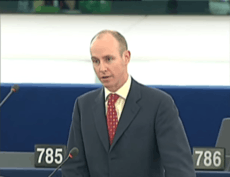
Hannan came to prominence after making a speech in the European Parliament criticising Gordon Brown.[28]
On 24 March 2009, after Gordon Brown had given a short speech to the European Parliament in Strasbourg in advance of the G20 London summit, Hannan followed up by delivering a 3-minute speech strongly criticising the response by Gordon Brown to the global financial crisis.[29]
He finished the speech with the phrase, "the devalued Prime Minister of a devalued government".[30] A video clip of the speech went viral on YouTube that evening,[31] attracting more than 630,000 views in 24 hours.[29][32] It became the 'most viewed today' YouTube video worldwide for two consecutive days.[32]
By November 2016, there had been over three million views of the clip.[30] The content of Hannan's speech has been criticised as "relatively easy to dismantle".[33].
Political positions
Localism
Hannan is an advocate of localism.[7] He believes that local government independence is impossible without giving fiscal autonomy.[34] To that end, he supports replacing Value Added Tax with a local sales tax, set by local councils.[7]
He cofounded a direct democracy group ("Direct Democracy") and was co-author, along with 27 Conservative MPs elected in 2005, of Direct Democracy: An Agenda for a New Model Party, which proposes the wholesale devolution of power and the direct election of decision-makers.[35] These ideas were developed further in a series of six pamphlets, The Localist Papers, serialised in The Daily Telegraph in 2007.[36]
He believes that local government independence is impossible without giving fiscal autonomy.[37] To that end, he supports replacing Value Added Tax with a local sales tax, set by local councils.[7]
Nationalism
Hannan is an advocate of national sovereignty and has questioned the idea that "nationalism causes war".[38]. Hannan has been referred to as a "British nationalist" and "British Gaullist".[39] In a debate prior to the EU Referendum in Great Britain, Hannan said "Being a nation means that we are not just a random set of individuals born to a different random set of random individuals. It imposes on us a duty to keep intact the freedoms that we were lucky enough to inherit from our parents and pass them on securely to the next generation."[40][41] He advocates for an affinity of "English-speaking nations" which share "Anglosphere characteristics".[42]
After British Labour party leader Jeremy Corbyn suggested[43] that the Elgin Marbles be returned to Athens, Hannan criticised Corbyn for "national masochism", writing in ConservativeHome that this confirms the view that Corbyn will "always and everywhere back another country against his own".[44] Hannan similarly criticised former Downing street Press secretary Alastair Campbell for "cheering for the other side" after Campbell retweeted positions of Irish Taoiseach Leo Varadkar on social media while Campbell, writing in The New European, suggested that Hannan was "claiming a monopoly on patriotism."[45]
Journalist Philip Collins, in Prospect Magazine, writes "Hannan has the constant tra-la-la effusiveness of a man forever on his way home from choral evensong at an Oxford college. There is a sense from all of them of living out a caricature. None of them thinks they have signed up for the narrow version of nationalism written in blood."[39]
Electoral reform
Hannan argues in his writings and in the media (for example, during an appearance on Question Time on BBC television on 28 May 2009) for ballot initiatives (whereby electors can directly enact legislation as happens in Switzerland), a power of recall (whereby a sitting Member of Parliament can be forced to submit to re-election if enough of the local electorate support this), fixed term parliaments, local and national referendums, open primaries and the abolition of party lists. He is also an advocate of Single Transferable Vote as a replacement for the UK's First Past The Post system of voting.
Economic policy
Hannan wrote in March 2011, criticizing anti-austerity protesters, stating they "have decided to indulge their penchant for empty, futile, self-righteous indignation". He remarked, "After "No Cuts!" the marchers' favourite slogan was "Fairness!" All right, then... How about being fair to our children, whom we have freighted with a debt unprecedented in peacetime?"[46]
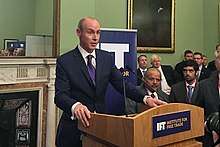
Hannan writes regularly about the United Kingdom's future international trade relationship once it leaves the EU.[47] In September 2017, he became the founding president of the Institute for Free Trade (IFT),[48] a free-market think tank based in London. The creation of the Department for International Trade (DIT) in July 2016 signalled the UK Government’s commitment to pursuing an independent trade policy for the first time since 1875. Seeing this, Hannan founded the IFT with the aim to fill the corresponding gap in UK-based research and expertise on trade issues, in order to contribute to a more informed government, legislature, business community and general public.[49]
The IFT briefly changed its name to "Initiative for Free Trade" after it emerged that permission to use the title "Institute", which is protected by law, had not been granted by Companies House and the Business Secretary. However, in Summer 2018, the name was restored. Critics, including prominent Labour MP Chuka Umunna, have described the organisation as "fanatical hard Brexit-supporting ideologues"[50]. However, supporters point to its intellectually diverse advisory board[49], including former Australian Prime Minister Tony Abbott and former Home Secretary Michael Howard.
Operating though his platform at the European Parliament and through the IFT, Hannan advocates a globally free-trading policy for the UK,[51] and has even suggested joining the trans-pacific partnership as the global economic weight shifts from west to east.[52]
Hannan is on the International Board[53] of Students for Liberty, a non-profit group operating globally to encourage classical liberalism and liberal economics.
Foreign policy
Hannan has a 'deep admiration' of the United States,[54] and describes himself as an Atlanticist with inherently positive views of the United States as well as other nations of the Anglosphere. Hannan is extremely supportive of free trade, believing that the European Union blocks trade with countries such as China, India and Ethiopia.[51]
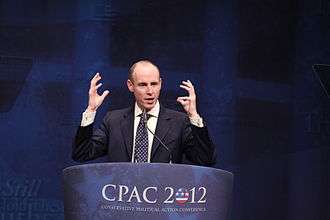
He opposed the 2003 invasion of Iraq undertaken during the premiership of Tony Blair.[55] He opposed British intervention in Libya.[54]
Hannan has proposed that Britain forge a "distinctive foreign policy, allied to Europe, but giving due weight to the US, India and other common-law, Anglophone democracies".[56]
He endorsed then-Democratic candidate Barack Obama for President on 18 October 2008 against John McCain. He stated that a McCain presidency would mean an "imperial overstretch", particularly arguing that the U.S. should have been preparing to leave Iraq immediately.[57]
Hannan regretted his endorsement, which he called in his blog his "single most unpopular post" in his blogging career, and backed Mitt Romney in 2012. He argued, "Any American reader who wants to know where Obamification will lead should spend a week with me in the European Parliament. I'm working in your future and, believe me, you won't like it."[58]
In the 2016 United States presidential election, Hannan argued that both main parties had put forward unfit candidates, and urged Americans to vote for the Libertarian, Gary Johnson.[59]
Social policy
Hannan is opposed to the concept of "victimless crimes", and he favours drug decriminalisation: "I'd start with cannabis, and if that worked I wouldn't in principle be against decriminalising heroin."[7]
Health care
In April 2009, he criticised claims that the National Health Service was the greatest British invention, saying that it is clearly eclipsed by the inventions of parliamentary democracy, penicillin, and common law, the discovery of DNA, or the abolition of slavery.[60]
Hannan claimed the NHS has left Britain with low survival rates for cancers and strokes, a high risk of becoming more ill in hospital, and with constant waiting lists. He remarked on American television at a time when the Patient Protection and Affordable Care Act was being debated that he "wouldn't wish it [the NHS] on anyone". David Cameron, who had said that his priorities were "three letters: NHS", distanced himself from Hannan's remarks as "some rather eccentric points of view".[61]
Writing in The Telegraph, Hannan said of the media storm provoked by his comments:
On a visit to the US, I was asked by an interviewer whether I would recommend a British-style health-care model, paid for out of general taxation. I replied that all three parties were devoted to the NHS, and that it had public support (although I added that this was at least partly the result of the inaccurate belief that free health care for the poor is a unique attribute of the British system). But I didn't want to dissemble: I have for years argued that Britain would be better off with a Singapore-style system of personal health-care accounts. So I cautioned against nationalisation, citing international league tables on survival rates and waiting times.[62][63]
At the same time, he made the wider point that:
we seem to have lost the notion that a backbencher speaks for himself. I like David Cameron, and want him to be Prime Minister, not least so that Britain stops racking up debt. But the idea that I therefore agree with him on every issue is, when you think about it, silly.[62]
In 2015, writing for The Washington Examiner, Hannan claimed the popular support for the NHS in the UK was a consequence of the wider public being "passively conscripted" by a "knot of hardline leftists" like those who had harassed his mother after he criticised the NHS. He told his readers "This is your last chance to strangle Obamacare at birth; flunk it, and you won't get another."[64]
Enoch Powell
It was reported in August 2009 that Hannan had praised the Conservative politician Enoch Powell as "somebody who understood the importance of national democracy, who understood why you need to live in an independent country and what that meant, as well as being a free marketeer and a small-government Conservative."[65]
However, he is also on record as saying, "For what it's worth, I think Enoch Powell was wrong on immigration. The civil unrest that he forecast, and that many feared in 1968, didn't materialise. Britain assimilated a large population with an ease that few countries have matched. Being an immigrant myself, I have particular cause to be grateful for Britain's understated cosmopolitanism."[66]
Writing on The Telegraph website, Hannan said: "I'm surprised that no one has picked up on the thing that I most admire about Enoch Powell, namely his tendency to ignore conventional wisdom and think things through from first principles. Like Rowan Williams, he always did his hearers the courtesy of addressing them as intelligent adults. Both men regularly got into trouble in consequence, either because they were genuinely misunderstood or because their detractors affected to misunderstand them. Neither responded by dumbing down. That, in politics, takes a special kind of integrity."[67]
Chequers Proposal
The government's policy on the future relationship between the United Kingdom and the European Union that the Cabinet had discussed at Chequers was published as a White Paper on 12 July 2018[68] for debate in the House of Commons the following week.[69] In July 2018, Hannan wrote in his Telegraph column regarding the Government's Chequers Proposal.[70] Distinct from the Government's position and from that of the ERG, Hannan argued that MPs should vote for the proposal despite its shortcomings, so long as it is not "watered down further". Summarising, he wrote that "The question is not whether the White Paper is ideal, but whether an imperfect departure is better than either a hostile breakdown or a more subservient relationship"[71].
He claimed that with Chequers, the UK Government was begging for the kind of deal the EU has with Moldova and Albania, who themselves only sought as a transitional arrangement towards full membership. Writing on the contents of the White Paper, Hannan claimed that "There is a good reason to accept EU standards on goods rather than services: half our goods exports go to the EU, but only 37 per cent of our services."[72] He also stated that since most goods standards are set at a global level, the concession to maintain EU standards on goods makes sense.[68]
UKIP
In spring 2012, Hannan suggested in a Daily Telegraph article that an accommodation be made between the Conservative Party and the UK Independence Party (UKIP),[73] and would be preferable to one with the Liberal Democrats.[74] However, following the 2016 referendum, he argued that UKIP members should "award themselves a medal and retire."
Good Friday Agreement
Writing in the Daily Telegraph, Hannan has argued that while the Good Friday Agreement was "often spoken about in quasi-religious terms … its flaws have become clearer over time".[75] Hannan's account of the Good Friday Agreement has been criticised as factually inaccurate[76] and reckless.[77]
Conservatism
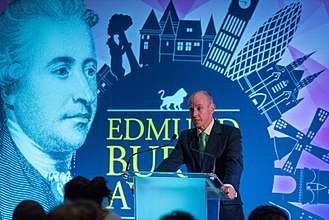
In September 2016, Hannan launched The Conservative,[78] a periodical publication in print volume and in an online version published quarterly. In an editorial, he defined its philosophy as follows: "Conservatism is an instinct rather than an ideology. It is ironic, quizzical, cool-tempered, distrustful of grand theories. Conservatives understand that the things they cherish – property rights, parliamentary government, personal freedom, norms of courtesy – take a long time to build up, but can be quickly destroyed."[79]
Hannan releases regular "Ici, Londres" videos across social media. The name is a reference to the beginning of every transmission from the Radio Londres station in London, from which the Free French broadcast over occupied France during World War II.
Awards and distinctions
In 2009, Hannan was awarded the Bastiat Prize for Online Journalism for his Telegraph blog.[80]
He won the award for Speech of the Year at the 2009 Spectator Awards, for his Gordon Brown speech in the European Parliament.[81]
2012 Columbia Award (Washington Policy Centre)[82]
2014 Paolucci Book Award (Intercollegiate Studies Institute)[83]
He was shortlisted for the Orwell Prize in blogging in 2011.[84]
In 2014, Hannan won the Political Books Awards polemic of the year award, for his book How We Invented Freedom and Why it Matters.[85]
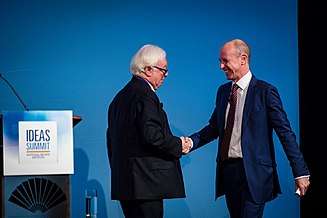
2017 Whittaker Chambers Award from the (National Review Institute) (pictured receiving it from John O'Sullivan)[86]
Bibliography
Books
- Hannan, Daniel (1993). Time for a fresh start in Europe. London: Bow Publications.
- Towards 1996: Britain in a Multi-Speed Europe. London, UK: Institute for European Defence & Strategic Studies. 1994. ISBN 978-0-907967-54-5.
- A Guide to the Amsterdam Treaty. London, UK: European Research Group. 1997.
- The Euro: Bad for Business. London, UK: European Research Group. 1998.
- What if Britain Votes No?. 2002.
- The Case for EFTA. London, UK: Bruges Group. 2004. ISBN 978-0-9547087-3-3.
- Direct Democracy: An Agenda for a New Model Party. Douglas Carswell. 2005. ISBN 978-0-9550598-0-3.
- The Plan: Twelve Months to Renew Britain. Douglas Carswell. Lulu.com. 2008. ISBN 978-0-9559799-0-3.
- The New Road to Serfdom: A Letter of Warning to America. London, UK: HarperCollins. 2010. ISBN 978-0-06-195694-2.
- Why America Must Not Follow Europe. New York: Encounter Books. 2011. ISBN 978-1-59403-560-9.
- A Doomed Marriage: Britain and Europe. London, UK: Notting Hill Editions. 2012. ISBN 978-1-907-90322-9.
- How We Invented Freedom & Why It Matters. London, UK: Head of Zeus. 2013. ISBN 9781781857533. (published in the United States as Inventing Freedom: How the English-Speaking Peoples Made the Modern World. New York: HarperCollins. 2013. ISBN 9780062231758. )
- Why Vote Leave. London: Head of Zeus. 2016. ISBN 9781784977108.
- What Next: How to Get the Best from Brexit. London: Head of Zeus. 2016. ISBN 9781786691934.
References
- 1 2 "Daniel Hannan @". sevenoaksconservatives.org. Retrieved 1 September 2012.
- ↑ "twitter.com/DanielJHannan". Daniel Hannanprofile. Retrieved 25 July 2016.
- ↑ "Daniel Hannan profile". European Parliament. Retrieved 25 August 2017.
- ↑ "IFT". IFT. Retrieved 25 January 2018.
- ↑ "Daniel Hannan". danielhannan.info. Retrieved 23 January 2018.
- ↑ Sam Knight (29 September 2016). "The man who brought you Brexit". The Guardian. Retrieved 8 July 2018.
- "Gisela Stuart to Chair Vote Leave campaign". Archived from the original on 27 July 2016. Retrieved 29 July 2016. - 1 2 3 4 5 6 7 8 Sylvester, Rachel; Thomson, Alice (5 October 2009). "Daniel Hannan: the Tory Eurosceptic MEP whom Labour loves to hate". The Times. Retrieved 16 December 2011.
- ↑ "Daniel Hannan & David Wilkins at the 2012 Manning Conference". YouTube. 13 March 2012. Retrieved 29 July 2016.
- 1 2 "David Cameron was right to apologise: Bloody Sunday diminished us all". Retrieved 17 June 2010.
- ↑ European Companion. London, UK: Vacher Dod Publishing. 2002. p. 135. ISBN 978-0-905702-37-7.
- ↑ Blair, David (1995). A History of the Oxford University Conservative Association. Andrew Page.
- ↑ Blair, David (1995). A History of OUCA. Andrew Page.
- ↑ Daniel Hannan "How Our One Small Protest Toppled the Pound", Daily Telegraph, 13 September 2002.
- 1 2 MEP biography, europarl.europa.eu; accessed 4 September 2017.
- ↑ "Latin Link", The Times (17 May 1997), pg. 22.
- ↑ Knight, Sam. "The man who brought you Brexit". The Guardian. ISSN 0261-3077. Retrieved 8 July 2018.
- ↑ "12 people who brought about Brexit". Politico. 25 June 2016. Retrieved 2 July 2018.
- ↑ Knight, Sam (29 September 2016). "The man who brought you Brexit". The Guardian. ISSN 0261-3077. Retrieved 8 July 2018.
- ↑ Daniel, Hannan. What next. London. ISBN 9781786691934. OCLC 966311650.
- ↑ "Daniel Hannan". Daniel Hannan. Retrieved 25 January 2018.
- ↑ George Eaton The NS Profile: Daniel Hannan, newstatesman.com, 20 August 2009.
- 1 2 "Daniel Hannan MEP". Aldershot. Retrieved 25 January 2018.
- ↑ Hannan, Daniel (17 January 2008). "EU treaty censored by Euro-federalists". The Daily Telegraph. London, UK. Retrieved 3 March 2008.
- "European Parliament debates". Webcitation.org. 30 January 2008. Archived from the original on 23 February 2009. Retrieved 14 August 2009. - 1 2 Hannan, Daniel. "Whatever else they are, MEPs are not Nazis". ISSN 0307-1235. Retrieved 25 January 2018.
- ↑ "Debates". European Parliament. 31 January 2008. Retrieved 7 March 2008.
- ↑ "Creeping EU Totalitarianism". YouTube. 18 February 2008. Retrieved 14 August 2009.
- "EU — The last days of democracy?". YouTube. 3 July 2008. Retrieved 14 August 2009. - ↑ "Daniel HANNAN: History of Parliamentary Service". European Parliament. Retrieved 6 November 2015.
- ↑ "Browns join Twitter war over NHS". BBC News. 13 August 2009. Retrieved 7 March 2012.
- 1 2 "Daniel Hannan MEP: The devalued Prime Minister of a devalued Government". YouTube. 24 March 2009. Retrieved 27 March 2009.
- 1 2 DanHannan (24 March 2009), Daniel Hannan MEP: The devalued Prime Minister of a devalued Government, retrieved 25 January 2018
- ↑ Martin, Iian (25 March 2009). "Hurrah for Hannan: Brown hasn't been spoken to like that for decades". Daily Telegraph. London, UK.
- Bingham, John (25 March 2009). "MEP Dan Hannan's 'Brezhnev apparatchik' attack on Gordon Brown is a YouTube hit". Daily Telegraph. London. Retrieved 27 March 2009. - 1 2 Walker, Kirsty (27 March 2009). "An internet sensation, the Tory who told Brown to his face that he's a disaster". Daily Mail. London, UK. Retrieved 27 March 2009.
- ↑ "Why has Daniel Hannan become an internet sensation?".
- ↑ "Let's put the local back into local elections". The Daily Telegraph. 30 April 2011. Retrieved 16 December 2011.
- ↑ "Jeremy Hunt co-authored book calling for NHS to be replaced with private insurance". The Independent. 10 February 2016. Retrieved 29 January 2018.
- ↑ "Localist Papers". witteringsfromwitney.com. Retrieved 20 March 2018.
- ↑ "Let's put the local back into local elections". The Daily Telegraph. 30 April 2011. Retrieved 16 December 2011.
- ↑ "Let's hear it for nationalism". The Washington Examiner. 25 September 2017. Retrieved 1 September 2018.
- 1 2 "Britain's new Gaullists".
- ↑ "Daniel Hannan on the Conservative Case for Brexit".
- ↑ EU Debate - Oxford Union. Daniel Hannan MEP, 20 March 2016, retrieved 1 September 2018
- ↑ "The World of English Freedoms: It's no accident that the English-speaking nations are the ones most devoted to law and individual rights, writes Daniel Hannan". The Wall Street Journal. 15 November 2013. Retrieved 1 September 2018.
- ↑ "Corbyn vows to return Elgin Marbles to Greece if he becomes prime minister". The Independent.
- ↑ "Daniel Hannan: On the Elgin Marbles, as on everything else, Corbyn's assumption is that Britain Is Always In The Wrong".
- ↑ Alastair Campbell. "Don't call me a traitor, Farridge". The New European.
- ↑ Hannan, Daniel (26 March 2011). "'March for the Alternative'? WHAT alternative?". The Daily Telegraph. Retrieved 27 March 2011.
- ↑ "Daniel Hannan". Daniel Hannan. Retrieved 29 January 2018.
- ↑ "IFT". IFT. Retrieved 25 January 2018.
- 1 2 "IFT". IFT. Retrieved 2018-08-26.
- ↑ "Boris Johnson under fire for waiving £6,000 fee for hard Brexit event at Foreign Office". The Independent. Retrieved 2018-08-26.
- 1 2 "Free Britain to trade with the world". Financial Times. 21 June 2016. Retrieved 8 November 2017.
- ↑ Hannan, Daniel. "Strange and counter-intuitive as it may seem, Britain's trading future lies across the Pacific". The Telegraph. ISSN 0307-1235. Retrieved 29 January 2018.
- ↑ "Team - STUDENTS FOR LIBERTY". STUDENTS FOR LIBERTY. Retrieved 20 March 2018.
- 1 2 "The war drums boom in Britain". The Economist. 18 March 2011. Retrieved 16 December 2011.
- ↑ Hannan, Daniel (30 March 2008). "Are we losing in Afghanistan?". The Daily Telegraph. London, UK. Retrieved 7 November 2010.
- ↑ Hannan, Daniel (2 June 2015). "A vision of Britain outside the EU - confident, successful and free". Daily Telegraph. ISSN 0307-1235. Retrieved 29 January 2018.
- ↑ "Why this conservative is for Barack Obama". Daily Telegraph. 18 October 2008.
- ↑ "Telegraph's Hannan: "I admit it: I was wrong to have supported Barack Obama"". sanctepater.com. Retrieved 29 January 2018.
- ↑ "Tory Brexiteer says he would have voted for US candidate who didn't know what Aleppo was". The Independent. 11 November 2016. Retrieved 29 January 2018.
- ↑ Hannan, Daniel (6 April 2009). "Americans! Don't copy the British healthcare system!". London, UK: Blogs.telegraph.co.uk. Retrieved 14 August 2009.
- ↑ "Cameron: 'NHS Is Our Number One Priority'". Sky News. 14 August 2009. Archived from the original on 14 July 2012. Retrieved 25 April 2010.
- "'Nasty Tories' beat retreat on hunting and spending cuts". Thisislondon.co.uk. Retrieved 14 August 2009. - 1 2 "There is no harm in agreeing to disagree Let's return to the good old days when MPs didn't always toe the party line, says Daniel Hannan". The Daily Telegraph. London, UK. 28 August 2009. Retrieved 30 April 2010.
- ↑ "Glen Beck with Daniel Hannan on UK NHS". YouTube. 20 August 2009. Retrieved 29 July 2016.
- ↑ "Kill Obamacare, or U.S. healthcare will suffer same fate as Britain". Retrieved 9 September 2016.
- ↑ Prince, Rosa (26 August 2009). "Daniel Hannan risks angering David Cameron by praising Enoch Powell". The Daily Telegraph. London, UK. Retrieved 30 April 2010.
- "Daniel Hannan & Enoch Powell: Spectacular Media Stupidity Guaranteed". The Spectator. 26 August 2009. Archived from the original on 30 August 2009. Retrieved 7 July 2010. - ↑ "Journalists' magic word". The Daily Telegraph. London, UK. 6 November 2007. Retrieved 30 April 2010.
- ↑ "Down with collective responsibility". The Daily Telegraph. London, UK. 28 August 2009. Retrieved 30 April 2010.
- 1 2 "The future relationship between the United Kingdom and the European Union". GOV.UK. Retrieved 2018-08-26.
- ↑ "Future Relationship Between the UK and the EU - Hansard". hansard.parliament.uk. Retrieved 2018-08-26.
- ↑ Hannan, Daniel (2018-07-14). "Theresa May's Brexit plan is an embarrassing climbdown, but I would vote for it nonetheless". The Telegraph. ISSN 0307-1235. Retrieved 2018-08-26.
- ↑ Hannan, Daniel (2018-07-14). "Theresa May's Brexit plan is an embarrassing climbdown, but I would vote for it nonetheless". The Telegraph. ISSN 0307-1235. Retrieved 2018-08-26.
- ↑ Hannan, Daniel (2018-07-14). "Theresa May's Brexit plan is an embarrassing climbdown, but I would vote for it nonetheless". The Telegraph. ISSN 0307-1235. Retrieved 2018-08-26.
- ↑ Hannan, Daniel (24 May 2012). "A deal with UKIP is preferable to one with the Lib Dems". telegraph.co.uk. Retrieved 7 December 2014.
- ↑ Hannan, Daniel (3 May 2013). "A Conservative–Ukip coalition might come sooner than you think". telegraph.co.uk. Retrieved 7 December 2014.
- "Leaders set to review EU's agenda after Eurosceptic surge". ITV News. 26 May 2014. Retrieved 8 December 2014.
- "The moment of our victory, we Eurosceptics seem determined to throw it all away". The Telegraph. 26 May 2014. Retrieved 14 November 2014. - ↑ Jack, Ian (2018-02023). "The Good Friday agreement is under attack. Can we really risk ditching it?". The Guardian. Retrieved 2018-09-01. Check date values in:
|date=(help) - ↑ "Brexiteers continue to spread their lies about the Good Friday Agreement".
- ↑ "Brexit: Irish government attacks 'reckless' Brexiteers for gambling with Northern Ireland peace process"".
- ↑ "Welcoming two newcomers On a pair of publications that will ponder the political puzzles of our day". The New Criterion. March 2017. Retrieved 20 March 2017.
- ↑ "The Conservative Online, Issue 2". The Conservative Online. January 2017.
- ↑ "Telegraph columnist and blogger Daniel Hannan awarded online prize". The Daily Telegraph. 27 October 2009. Retrieved 16 December 2011.
- ↑ "Lord Mandelson named Politician of the Year". The Daily Telegraph. 12 November 2009. Retrieved 16 December 2011.
- Dale, Iain; Brivati, Brian (4 October 2011). "The Top 100 most influential people on the Right 2011, 50–26". The Daily Telegraph. Retrieved 16 December 2011. - ↑ "2012 Annual Dinner, Featuring Daniel Hannan and Scott Rasmussen". www.washingtonpolicy.org. Retrieved 6 June 2018.
- ↑ "Daniel Hannan Has Won the Paolucci Book Award". www.adweek.com. Retrieved 6 June 2018.
- ↑ Lachno, James (27 April 2011). "Christopher Hitchens' memoir among Orwell Prize 2011 nominations". The Daily Telegraph. Retrieved 23 January 2012.
- ↑ "The Paddy Power Political Book Awards". Retrieved 29 July 2016.
- ↑ National Review Institute (18 May 2017), Whittaker Chambers Award Dinner honoring MEP Daniel Hannan, retrieved 6 June 2018
External links
| Wikiquote has quotations related to: Daniel Hannan |
- Conservative Party website
- Daniel Hannan on Twitter.
- Daniel Hannan on Facebook.
- Articles at The Telegraph
- Profile at European Parliament website.
- Appearances on C-SPAN.
- Video of his attack on Gordon Brown.